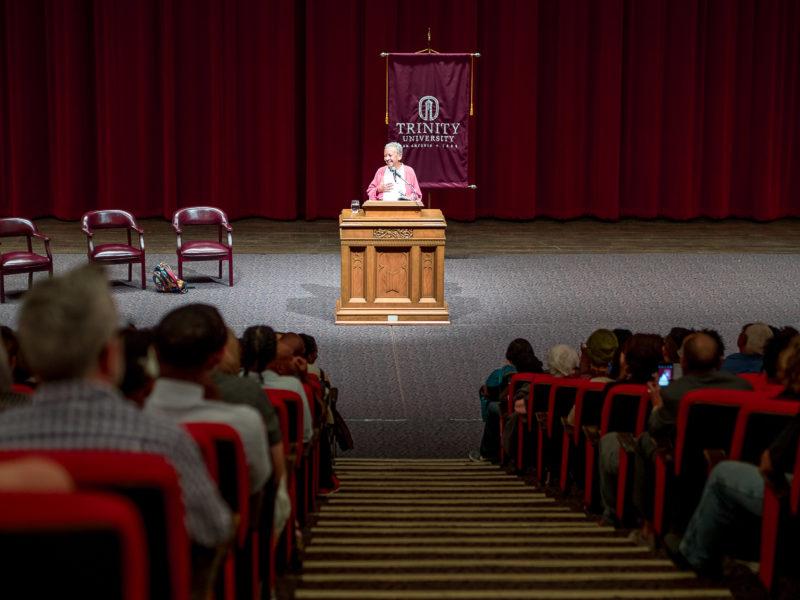On Oct. 10, Laurie Auditorium was filled with people who came to hear esteemed writer and poet Nikki Giovanni speak. She visited as a part of the DeCoursey Lecture Series, which alternates speakers from the sciences and humanities and has featured speakers, such as Jane Goodall, in previous years. This event marks the second time Giovanni has spoken at Trinity.
Giovanni is well-regarded for her contributions to poetry, and is considered one of the most famous African-American poets. Her writing has received countless accolades and nominations from acclaimed organizations and people, including the National Association for the Advancement of Colored People (NAACP) and Oprah Winfrey.
Giovanni was introduced to the audience by junior Arianna Payson, a double major in theater and English with a minor in creative writing. In her introduction, Payson revealed her admiration of the poet.
“Gotta be honest, I’m a little starstruck now,” Payson said.
Payson’s awe was a result of all that Giovanni has accomplished during her 73 years.
“A few words to describe her are: poet, dream-maker, culture-creator, legend, artist, teacher, student, loved one, chance-taker, trend-setter, granddaughter, mother, lover of life and all things good,” Payson said.
Giovanni has been awarded over 20 honorary degrees, and numerous awards, such as the NAACP Image Award and the Langston Hughes Medal. She has also been nominated for awards she has yet to receive, such as a Grammy, and she acknowledged the awards she has yet to earn during her lecture.
“Everybody who says they don’t want a Nobel Prize is just a damn liar,” Giovanni said.
Jenny Browne, professor of English, encouraged her students to attend Giovanni’s lecture.
“I think she’s transcendent. She is just one of those people both in age and race that transcends the boundaries of social movements, of gender and race and of genre. She can speak out about these things but is also of them, suggesting that it’s possible,” Browne said.
Payson also spoke about Giovanni’s importance primarily as a poet.
“People like Giovanni provide this legacy for other people to jump off. Poetry is an amazing way to protest things you disagree with. It is nonviolent, eloquent and emotionally charged, and I think a lot of her early stuff talks about this. She’s also really funny, which is great,” Payson said.
Before Giovanni presented her speech, she attended campus events, including a discussion with a group of poetry students. She introduced herself not as a poet or an activist, but as someone who actually has a bat named after her: the Micronycteris giovanniae, better known as the Giovanni’s small night flyer.
Giovanni told anecdotes that often made the students laugh during this more personal session.
“Rather than speak directly about writing poetry or style or poetic devices, she mostly just talked about life and life’s experiences. Just by talking about her life and the things that she’s experienced, she opened up to me new ways to look at my life and extract inspiration from the things that I see and do,” said Vladislav Chalenko, a sophomore biology and history double major.
Giovanni ended the discussion by expressing her hope that she would be able to live another ten years in order to read what the writers of the future would produce and share, including writing students at Trinity.
“I’m really excited and hoping that I will live long enough to read what you [Trinity students] will eventually write,” Giovanni said.
Although she opened her speech by thanking the Trinity writing students, her friends at Texas A&M and Deneese Jones, the vice president of academic affairs, she claimed that she was not actually a people person. Giovanni maintained great charisma and frankness into the lecture, however.
“I’ve really gotten out of the habit of doing these lectures because if you make sense, then no one listens to you, and if you don’t make sense, then nobody listens to you, so what the hell,” Giovanni said.
Her frankness was especially apparent with regards to politics, which she discussed at length, as the second presidential debate had aired just prior to her lecture.
“Last night I stayed up late to hear that fool talk. That little Nazi standing around talking about how he’s going to grab somebody, and it really makes you upset because nobody running for the president of the United States should not say the things he said. I don’t care how long ago he said it. I hope that whatever you [teenagers] have done, you have registered to vote. Vote for Hillary of course, because that’ll show you have good sense,” Giovanni said.
Besides politics and voting, Giovanni also spoke about Rosa Parks, sex versus love, space exploration and read two of her poems: “Deal or No Deal” and “Cotton Candy on a Rainy Day.” These selected poems she shared are frequently quoted and referred to by other scholars and writers. She ended her lecture by reading “Rosa Parks,” another of her more well-known poems.
“But it was the Pullman Porters who safely got Emmett [Till] to his granduncle and it was Mrs. Rosa Parks who could not stand that death and in being unable to stand it, she sat back down,” Giovanni said; her concluding lines received a standing ovation from the crowd.
The impact Giovanni’s words had on her audience was evident in the energy and awe of spectators, who were quick to applaud her and thank her for presentation as she finished her speech.
“I think anyone who got out the other night would have found something to relate to,” Browne said.
Those interested in the opportunity to attend another lecture can find a list of upcoming speakers for the remainder of the fall semester in timely Leeroy announcements.







